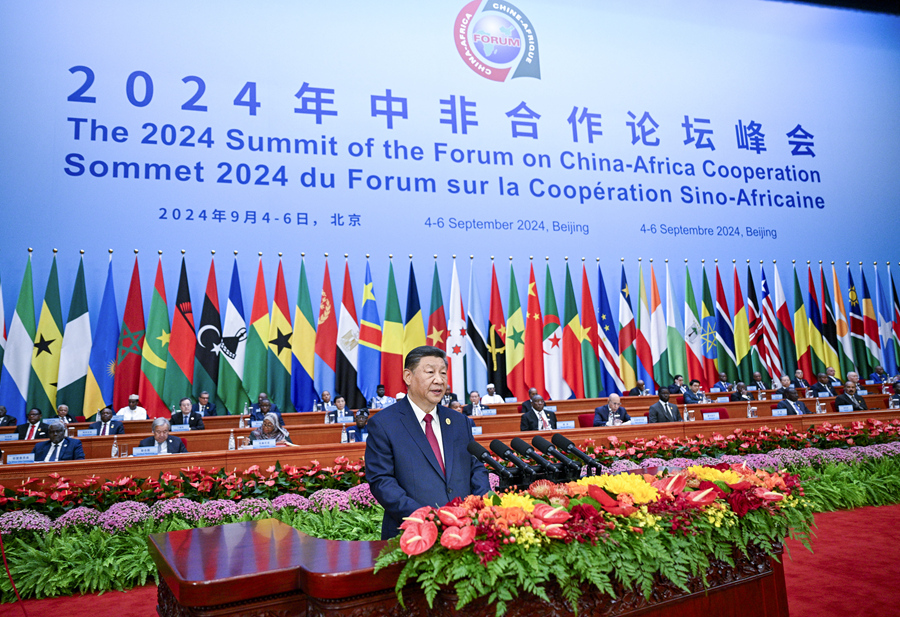Despite speculation of declining Chinese interest in Africa, this year’s FOCAC, held from September 4-6, saw a US$50.7 billion financial commitment. With 53 out of 54 African countries represented, many by heads of state, Chinese leader Xi Jinping heralded the relationship as “the best in history.” Picture source: The People’s Government of Beijing Municipality, September 6, 2024, https://www.beijing.gov.cn/gate/big5/www.beijing.gov.cn/ywdt/dzyjs/202409/t20240906_3791095.html.
Prospects & Perspectives No. 57
FOCAC 2024 Outcomes: China’s Strategic Pivot in Africa
By Jana de Kluiver
This year’s Forum on China-Africa Cooperation’s (FOCAC) outcomes aligned well with the African Union’s (AU) Agenda 2063. This forum created opportunities for advancing African development goals while offering Chinese firms valuable investment opportunities and market access. However, the summit made clear that for Beijing, the political dimension of the relationship is now as important, if not more, than its economic underpinnings.
Despite speculation of declining Chinese interest in Africa, this year’s FOCAC, held from September 4-6, saw a US$50.7 billion financial commitment. With 53 out of 54 African countries represented, many by heads of state, Chinese leader Xi Jinping heralded the relationship as “the best in history.” While this claim raises questions — particularly given that past summits have seen higher financial commitments — the depth of the Sino-African partnership remains undeniable. With cooperation from trade and infrastructure investments to education and security, FOCAC 2024 has set up a solid foundation to increase ties in the coming years.
Notable FOCAC 2024 outcomes
In this year’s summit, African states sought market access, critical infrastructure investment, and opportunities to move up value chains. Many of the agreements reflected these priorities. Xi announced zero-tariff treatment on all tariff lines for Africa's 33 Least Developed Countries (LDC). In contrast, countries such as Tanzania, Kenya, Zimbabwe, and South Africa secured deals to boost agricultural exports. Infrastructure also remained a focal point, with China committing US$1 billion to upgrade the Tanzania-Zambia (TAZARA) railway, one of 30 projects to enhance regional connectivity. Zimbabwe’s deal to refine lithium domestically marked a significant shift towards value-added production, illustrating progress in advancing the value chain from raw exports.
China has also made substantial investments in African human capital, another critical aspect of its evolving strategy. During the summit, Beijing pledged scholarships for 60,000 African students over the next three years and training programs for 6,000 military personnel and 1,000 police officers. These pledges included a commitment to send 1,000 members from African political parties to China to enhance exchanges of experiences in governance and state management. Although these initiatives respond to Africa’s development needs, they also serve China’s broader aim of cultivating long-term strategic relationships with future African leaders. By investing in education and cultural exchange, China seeks to build goodwill and offset rising anti-China sentiment in countries like Zambia and Kenya, where protests have erupted over concerns about economic dominance and local job displacement.
Africa’s increasing geopolitical importance to China and the world
Beijing has made it clear that Africa plays an important role in its foreign policy, as evidenced by the long-standing tradition that Chinese foreign ministers make their first official visit of the year to Africa. This year’s FOCAC also saw the upgrade of all of China’s diplomatic relations with African states to “strategic partnerships.” Although it is difficult to understand exactly how this would manifest in practice, it reaffirms Beijing’s commitment to deepening the relationship.
In order for China to sustain its economic and political rise within the current world order, it is pivotal that Beijing gains legitimacy through support from the Global South. It is in this space that strong alliances with African states are central to enhancing Beijing’s credibility and strengthening its voice in international forums. With 54 votes in the United Nations General Assembly, Africa is a vital bloc of countries, particularly in the context of reforming global institutions and promoting an alternative development model.
Lessons for the West
As Western influence in Africa has diminished — exemplified by France’s military exit from Mali and anti-American protests in Niger — there is a growing need for Western states to rethink their engagement strategies on the continent. China’s ability to operate without imposing governance conditionalities has made it an attractive partner for many African governments. Unlike Western donors, who often tie aid to human rights or governance reforms, China adheres to a principle of “non-interference.” This approach resonates with African leaders focused on immediate economic growth and infrastructure development.
China’s remarkable transformation from poverty to a global economic powerhouse gives it unique credibility in Africa. Until 1996, just four years before the creation of FOCAC, China’s per capita GDP was lower than that of sub-Saharan Africa, relegating it to a marginal role in the region. Today, its significant standing in the global economy legitimizes its promotion of the China model for development in Africa.
The Sino-African relationship is not without challenges. Concerns regarding debt dependency, transparency, and trade imbalances, among others, are pressing issues that African states must navigate carefully. However, China’s ongoing prioritization of Africa in its foreign policy and willingness to adapt strategies to align with African realities have yielded significant successes.
The key takeaway for Western states should not be to abandon their unique value proposition in favour of a Chinese model, but rather to see how consistent prioritization of Africa in foreign policy and a clear strategy can go a long way. Western states’ engagement with the continent has different challenges, but there is still ample room for cooperation. For example, while Western countries are well within their rights to continue emphasizing governance and human rights, they should also strive to understand the complexities of African systems better and respect the desire for agency among African nations.
The Sino-African partnership has progressed based on the mutual ground between the partners. Yes, Beijing has been tactful in nurturing and promoting these ties, but the reality is that the relationship has sprung deep roots and is unlikely to wither any time soon. Healthy competition among external powers can enhance the quality and competitiveness of the deals offered to African states. Instead of diminishing China's influence, Western countries should focus on providing more appealing alternatives and, when beneficial, collaborate to address shared priorities.
African agencies should remain central
African states are not passive recipients in these dynamics; they are increasingly influential actors on the global stage. With Africa projected to be home to over 2.5 billion people by 2050, the continent is central to future global economic and geopolitical strategies. African nations must skillfully navigate their relationships with China, the West, and other emerging powers like India and Turkey, balancing external partnerships to their advantage. A more assertive, coordinated African strategy, guided by frameworks like the AU’s Agenda 2063, will help the continent leverage its relationships with external powers more effectively.
(Jana de Kluiver is a Research Officer at Africa in the World, Institute for Security Studies in Pretoria, South Africa.)


